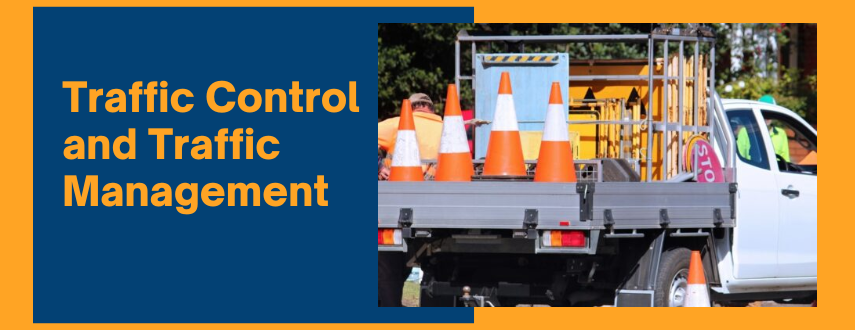Managing traffic disruptions caused by construction, events, or emergencies requires a coordinated approach to ensure safety and efficiency. Although traffic control and traffic management are often used interchangeably, they address distinct aspects of traffic coordination. Both play crucial roles, especially when provided by a reputable traffic control company in Sydney, in ensuring seamless road operations.
[A] Understanding Traffic Control
Traffic control is the practical aspect of managing traffic, focusing on the on-the-ground execution of traffic management plans. Traffic controllers ensure the safe movement of vehicles and pedestrians through areas affected by construction, events, or emergencies. Their tasks include directing vehicles using stop-slow bats and hand signals, and setting up and maintaining safety barriers such as cones and signs. Additionally, they ensure pedestrian safety, particularly for vulnerable groups like the elderly or those with mobility challenges.
Traffic controllers also play a key role in coordinating with team members through handheld radios to maintain smooth traffic flow. Their responsibilities extend to monitoring and reporting any traffic violations and contributing to risk assessments to improve on-site safety. These efforts make them indispensable to traffic management services in Sydney, ensuring road safety and efficiency.
Training and Certification for Traffic Controllers
Traffic controllers undergo specialised training to perform their duties effectively. This training includes mastering the safe use of tools like stop-slow bats, as well as communication techniques to manage diverse traffic scenarios. They also learn the intricacies of traffic guidance schemes and safety protocols. Certification is mandatory and valid for three years, with refresher courses required to keep their skills and knowledge updated to current industry standards.
Why Traffic Control Matters?
Traffic control ensures the safety of workers, drivers, and pedestrians during road disruptions. By minimising risks and preventing accidents in work zones, traffic control reduces delays, ensuring smooth navigation. It also guides road users in unfamiliar or challenging traffic conditions.
[B] Understanding Traffic Management
Traffic management involves strategic planning and supervision, focusing on long-term and complex traffic challenges. Traffic managers design comprehensive traffic management plans, considering the project’s scale and duration, as well as surrounding factors like businesses and peak traffic hours. They assess potential risks and hazards beforehand, ensuring safety and efficiency. Collaboration with stakeholders, including local councils and contractors, is another critical responsibility to ensure alignment with regulatory requirements.
In addition to planning, traffic managers oversee the implementation of these strategies, ensuring compliance and efficiency. Their work often includes preparing detailed reports and submitting them to relevant authorities to maintain accountability. By incorporating professional traffic management services in Sydney into their operations, organisations can effectively minimise disruptions, streamline traffic patterns, and ensure a safer, more efficient flow of vehicles and pedestrians during construction, events, or other roadwork activities.
Certification for Traffic Managers
Traffic managers undergo advanced training to qualify for their roles. This training covers the development of detailed traffic guidance plans, risk assessment strategies, and techniques for managing complex scenarios, such as lane closures or detours. Communication with traffic controllers and stakeholders is also emphasised. Like traffic controllers, traffic managers must renew their certification every three years to ensure their knowledge stays current and relevant.
Why Traffic Management is Crucial?
Strategic traffic management is essential for maintaining the overall flow of traffic during disruptions. It minimises the impact on daily commuters and ensures that construction or event-related traffic issues are resolved proactively. By creating cohesive and well-coordinated traffic plans, traffic management prevents potential problems from escalating, ensuring smooth operations for all stakeholders.
[C] Collaboration Between Traffic Control and Traffic Management
Although traffic control and management address different aspects of traffic coordination, their collaboration ensures successful road operations. For instance, in a construction project, traffic managers devise the overall strategy, factoring in safety risks and traffic patterns. They prepare a detailed traffic plan, specifying signage, detours, and required personnel. Traffic controllers then execute this plan on-site, directing vehicles and pedestrians effectively. Throughout the project, traffic managers monitor the plan’s implementation, adjusting strategies based on real-time feedback from traffic controllers and other stakeholders. This seamless integration highlights the value of comprehensive traffic management services in Sydney.
[D] Career Opportunities in Traffic Coordination
A career in traffic coordination often begins with becoming a certified traffic controller. With experience and additional training, individuals can progress to roles in traffic management, taking on responsibilities like planning and oversight. Reputable traffic control companies in Sydney recognise the value of nurturing talent, offering career growth opportunities that bridge the gap between operational and strategic traffic coordination roles.
Why Choose RD Facilities Management?
Effective traffic control and management are critical for ensuring road safety, minimising disruptions, and optimising operations. Whether you’re managing a construction site or hosting a major event, RD Facilities Management can help! We provide professional traffic management services in Sydney, for your specific needs. Call us today at 1800 507 552 to learn more about our services and how we can assist with your project.








